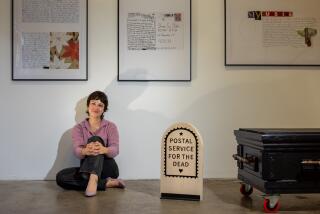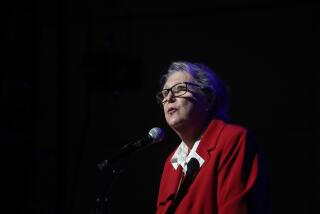Licking Loneliness for U.S. Troops : Morale: Letters from elementary school pupils are keeping American soldiers in the Mideast informed.
- Share via
Dear Soldier,
My name is Laura. I am 9 years old and I am in the fourth grade. . . . I think it is wonderful that you and other soldiers are far away in the heat taking care of us and our country. I hope you come back soon.
In careful script, the fourth-graders copied onto good white paper the letters they had written in pencil on recycled paper. These final copies, written in ink, would carry the children’s messages to U.S. troops stationed in Saudi Arabia.
The crisis in the Middle East has become for six classes of third-, fourth- and fifth-graders from Cowan Avenue Elementary School in Westchester more than a passing current events topic or a blurb they hear on a newscast.
They have become participants in the news.
My dad was in the Navy. He survived. You will, too. I know you miss your family and your friends. I’m your friend and I miss you and all of the U.S. Army.
When they hear about Iraq or Saddam Hussein or oil, their ears perk up. Susan Blackwell-Brown regularly discusses current events with her third-graders. But when they talked about the situation in the Middle East, she found that they were “real aware of it--more concerned than I realized.”
Her class came up with the idea to write letters when Blackwell-Brown compared the troops stationed in Saudi Arabia to going away to camp. Many of the children said that when they’re at camp and get lonely, letters from their parents made them feel better. So they decided to write to the troops. “They thought it was a great idea,” she said.
“We do not want them to feel like there’s no one worrying about them,” fifth-grader Tayquail Sam said. “Grown-ups aren’t the only ones caring.”
Principal Richard Frey said the letter-writing project was “a very good idea not only to boost the morale of our service men and women, but also to give a memorable experience to our children. . . . It’s using current history to make things come alive.”
I am really good at Nintendo. I have eight games.... Monday I made a bug house but I couldn’t find any bugs. I only found a hornet.
The children were encouraged to write about themselves, their hobbies and pets, vacations, sports, and families. The finished products were filled with pet names and school activities, and several included their parents’ ages.
Barbara Freia’s fifth-graders wrote to the servicemen about current gas prices and the weather. Richard Fernandez asked in his letter if “you have battery operated fans over there in Saudi Arabia like they say on the news. Like some people say you can’t always trust what the news says.”
Some of the children drew pictures with crayons or enclosed snapshots of themselves to send with their letters. “My mom said I may be a wall-pin-up-girl,” wrote fourth-grader Bri Webber in a postscript.
In their letters, many of the children included their home or school addresses and asked the servicemen to write back.
The letters will be sent to Operation Desert Shield in New York and will be forwarded to the troops. Two classes at Cowan are making their effort more personal by sending their letters to one troop of Marines in particular. One of the teachers is a friend of the parents of one of the Marines.
According to Ladera Heights resident Carol Harris, whose son, Jim, is a rifle platoon commander stationed at the Kuwaiti border, the children’s letters will be welcome.
“Boredom seems to be a real problem,” she said. In his six letters and one phone call to his parents, “(Jim) said over and over that mail call is the highlight of the day. He said when a package arrives, you don’t just read it, you share it with everybody. A hundred to 150 people will read the mail.”
What’s it like being in the army? Is it hard or fun? Are the suits you are wearing hot? What do you do all day? What do you eat? Would you like to be my pen pal?
After some thought, fourth-grader Kashawn Mason said the soldiers were “probably in the desert digging holes so when we have a war they’ll have protection.”
Andre Newman was almost certain they were playing cards. “That’s what my dad did when he was in the Marine Corps.” Huston Holley figures that the soldiers are bored. “They don’t have any TV,” he said.
“On all the army movies on TV, they’re usually gambling for cigarettes,” Gary Harris said.
More to Read
Sign up for Essential California
The most important California stories and recommendations in your inbox every morning.
You may occasionally receive promotional content from the Los Angeles Times.












